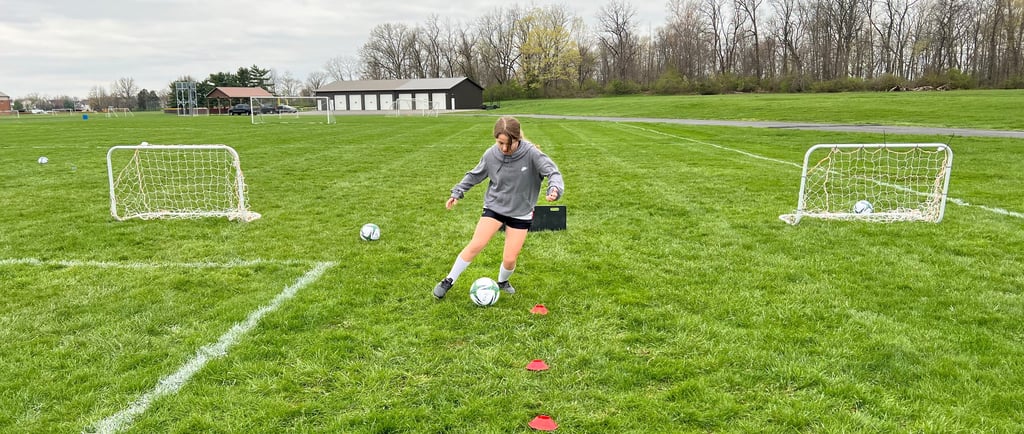How Often Should My Child Train Outside of Team Practices?
As a parent of a young soccer player, it’s natural to wonder: How often should my child train outside of their regular team practices? You want them to improve, stay motivated, and love the game—but you also don’t want to burn them out or overload their schedule.
5/6/20254 min read


How Often Should My Child Train Outside of Team Practices?
Introduction
As a parent of a young soccer player, it’s natural to wonder: How often should my child train outside of their regular team practices? You want them to improve, stay motivated, and love the game—but you also don’t want to burn them out or overload their schedule.
This question doesn’t have a one-size-fits-all answer, but there are proven guidelines based on age, skill level, goals, and overall well-being. In this post, we’ll break down how often kids should train outside of team practices, share sample schedules, and offer expert advice to help you strike the right balance between development and fun.
1. Why Extra Training Matters
Team practices are crucial, but they often focus on team tactics, shape, and overall game understanding. Individual development—things like first touch, weak foot, speed, and ball mastery—can be limited in a group setting.
Benefits of Training Outside Team Practice:
Personalized skill development
Increased confidence with the ball
Greater consistency and focus
Accelerated improvement
More time to master technical fundamentals
Whether it's a few extra touches in the backyard or a structured private session, consistent training outside of the team environment can make a huge difference.
2. Factors That Influence the Right Training Schedule
There’s no perfect formula, but you can build a smart training schedule for your child by considering:
A. Age & Development Stage
Younger players need more unstructured play and rest. As kids grow older, their training can become more focused and consistent.
B. Playing Level & Aspirations
Is your child playing recreational, club, or academy soccer? Do they aspire to play in high school, college, or professionally?
C. Current Team Commitments
How many days per week do they already train or play games? Make sure additional training complements, not conflicts, with those activities.
D. Injury History & Recovery Needs
If your child has been injured or is experiencing growing pains, prioritize rest, mobility, and recovery.
E. Motivation & Mental Health
Burnout is real. Make sure your child is still having fun, and encourage them to speak up if they’re feeling overwhelmed.
3. Recommended Training Frequency by Age Group
Here’s a general guide to how often kids should train outside of team practice based on age and level:
Ages 5-8 (Beginner/Rec Level)
Recommended: 1-2x per week (20-30 minutes)
At this stage, the focus should be on fun, creativity, and ball touches. Short, informal sessions in the backyard or with a parent/coach are ideal.
Activities:
Juggling
Ball mastery
Dribbling obstacle courses
1v1s with siblings or friends
Ages 9-12 (Competitive Club Level)
Recommended: 2-4x per week (30-45 minutes)
This is a key age for developing technical ability and building good training habits. Extra touches can make a big difference.
Activities:
Weak foot work
Passing against a wall
Shooting and finishing drills
Small-sided games
Ages 13-15 (High School/Advanced Club Level)
Recommended: 3-5x per week (45-60 minutes)
Players at this level are starting to get serious. Training should be structured, but not so intense that it leads to burnout.
Activities:
Strength & conditioning
Tactical video analysis
Game-speed drills
Private coaching sessions
Ages 16+ (College/Elite Level Aspirations)
Recommended: 4-6x per week (60+ minutes)
At this stage, players should train like athletes. Quality is just as important as quantity, with rest and recovery built into the plan.
Activities:
Position-specific training
Advanced tactical work
Strength training
Recovery sessions (foam rolling, yoga, etc.)
4. Sample Weekly Training Schedule (Age 12 Example)
Let’s look at a sample week for a 12-year-old playing at a competitive club level with two team practices and one game:
Monday: Light backyard ball work (20 min)
Tuesday: Team practice
Wednesday: Rest or recovery activity (light juggling or walk)
Thursday: Team practice
Friday: Private training or shooting practice (45-60 min)
Saturday: Game
Sunday: Free play or unstructured training (fun challenges, 1v1s)
This schedule balances touches, rest, and variety while keeping the focus on enjoyment.
5. Balancing Training with Life
Your child isn’t just a soccer player. They’re a student, a friend, a family member—and sometimes, they just need time to be a kid. Here are some tips to keep it balanced:
Monitor their energy and attitude
Avoid back-to-back intense days
Encourage breaks and free play
Support other interests
Let them lead the way (if they ask to train, great! If not, that’s okay too)
6. Signs Your Child May Be Overtraining
It’s important to watch for signs of physical and mental fatigue:
Chronic soreness or frequent injuries
Drop in performance
Loss of motivation or joy
Sleep disruption
Mood swings or irritability
If you notice these signs, scale back the training and focus on rest, recovery, and fun.
7. Making the Most of Extra Training Time
When your child does train outside of team practices, here’s how to make it count:
A. Set Clear Goals
Pick 1-2 skills to focus on each week.
B. Track Progress
Use a journal or video to see improvement over time.
C. Vary the Activities
Keep things fresh with different drills and challenges.
D. Include Fun Elements
Incorporate music, games, and mini-competitions.
E. Get Professional Help
Work with a private coach who understands your child’s needs and development goals.
8. Private Training: A Powerful Supplement
One of the best ways to add structured, impactful training is through private coaching. At FC Training, we offer customized sessions that help players improve faster and build confidence in a supportive environment.
Benefits of Private Training:
Personalized drills based on your child’s needs
One-on-one feedback
Mental and tactical development
Accelerated progress and accountability
If you’re not sure how to fit private training into your child’s schedule, we can help you build a plan that works.
Conclusion: Train Smarter, Not Just Harder
So, how often should kids train outside of team practices? It depends on their age, goals, and overall lifestyle. But the bottom line is this: consistent, enjoyable, and age-appropriate training can lead to huge improvements over time.
Whether it’s five minutes of juggling in the backyard or a high-intensity private session, every touch counts—as long as your child is having fun and staying healthy.
Ready to build a smart, personalized training plan for your player?
Schedule a private session with FC Training and let’s take their development to the next level.
Get in touch
Reach out to book a session or get additional information!


"Coach Thomas has helped my daughter greatly progress at soccer. Before she started private training with him, she didn't have a lot of confidence. She also wanted to improve on her technical abilities as a soccer player. Thomas began working with her and we saw changes almost instantly. He has helped her gain confidence and she has fun during her sessions with him. Her decision-making skills have increased along with her ability to score. We are very thankful for the help and direction we've received from Thomas, it has been vital to our daughter's development as a soccer player."
Sarah C.
★★★★★
